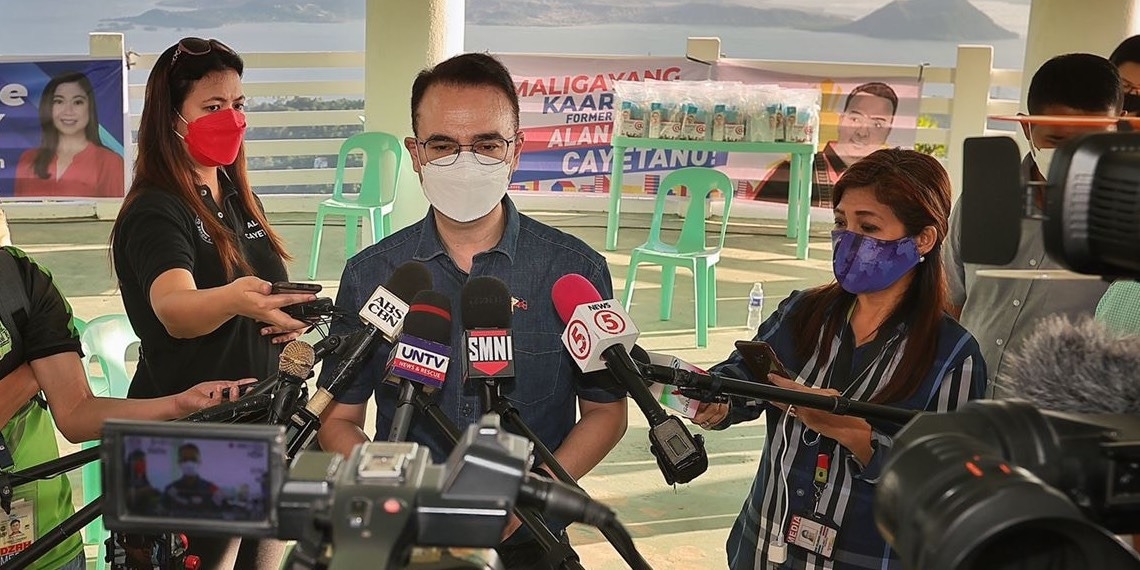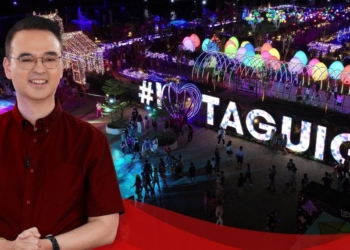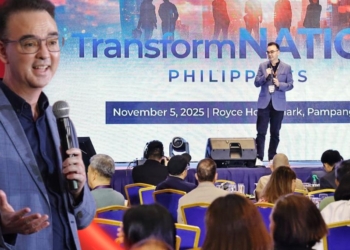“Gusto niyo walang isyu sa vote buying? Ibigay niyo yung sampung libong ayuda bawat pamilyang Pilipino para wala nang problema.”
This was former House Speaker Alan Peter Cayetano’s advice to government as the issue of vote buying surfaced once more with the political season beginning to heat up.
In an interview with with reporters on the sidelines of a donation event for horse jockeys displaced by pandemic travel restrictions in Tagaytay City on Wednesday, October 27, 2021, Cayetano said the country’s policymakers should accelerate the distribution of direct cash aid to all Filipino families to lessen the draw of politicians bent on buying votes during next year’s campaign season.
Cayetano and his allies in the Balik sa Tamang Serbisyo (BTS) sa Kongreso have been pushing for the 10K Ayuda Bill which seeks to provide every Filipino family with P10,000 in direct aid to help them with their daily needs as well as put up their own small businesses.
The proposed measure was filed in February and was consolidated into Bayanihan 3, but the provision of P10,000 for every family was not adopted.
Cayetano also called on the government to crack down on gambling, illegal drugs and smuggling since these are the source of vote-buying funds for corrupt politicians.
“Ang nagbibigay ng pera para makapagbili ng boto ang mga pulitiko ay ang mga gambling lords, drug lords at smugglers,” Cayetano said.
(The ones funding the vote buying operations of politicians are the gambling lords, drug lords and smugglers.)
The lawmaker suggested a nationwide crackdown on gambling operations, including e-sabong or online cockfighting and other online gambling networks, as well as intensified anti-illegal drugs and anti-smuggling campaigns, to disrupt the flow of cash to unscrupulous politicians.
Raising the concern that the economic crunch brought about by the pandemic will make voters more vulnerable to vote buying, Cayetano pointed out that the government has an additional P500 billion to spend in the proposed 2022 national budget.
He said P200 billion of this could be used to give direct stimulus grants of P10,000 to every Filipino family.
He warned that many households have been put on dire straits because of the impact of the COVID-19 pandemic on the country’s economy, making even the frequently small payouts given by political campaigns to voters in exchange for assured votes or withdrawals of support for rivals potentially attractive.
He also called on the Commission on Elections (Comelec) to watch out for abnormal activity among the country’s fintech services, saying digital wallets could be used to facilitate massive vote buying and escape regulatory oversight.
“Y’ung isang dapat bantayan ng Comelec ay yung digital wallets, yung GCash, yung PayMaya. Kasi di katulad ng dati, pagka yung isang bahay, ang haba ng pila, namimigay ng limandaan, isang libo, kita mo nang vote buying. Ngayon kasi may digital na,” Cayetano said.
(One of the things Comelec should be watching are those digital wallets, like GCash and PayMaya. Unlike before, when a long line forms outside a house where people are given 500- and 1,000-peso bills, it’s easy to spot vote-buying. Now it could be done digitally.)
He said state regulators should look into increasingly popular e-sabong operations, which according to him are routinely pulling in P1 billion in gross revenues daily and are starting to influence media and politics in the country.
“Yung e-sabong, sinusubukan nang impluwensyahan ang media, ang pulitika, ang kandidato,” the lawmaker warned.
(Those e-sabong operations are now trying to influence the media, politics, even our candidates.)
Aside from cracking down on gambling, illegal drugs and smuggling, Cayetano said voter education is crucial to cutting the levels of vote buying in the country.
“Yung voter education, responsibilidad naman nating lahat yan. Walang namang isang institusyon — maging magulang, titser, simbahan, media — ang may sole responsibility niyan, lahat yan ay sa atin,” Cayetano said.
(Voter education is the responsibility of everyone. No one institution – whether that be parents, educators, the church, media – has the sole responsibility for this, rather, it’s on all of us.)
The former House Speaker also suggested that media outfits mount a campaign to combat vote buying in the run-up to the elections in May 2022.






